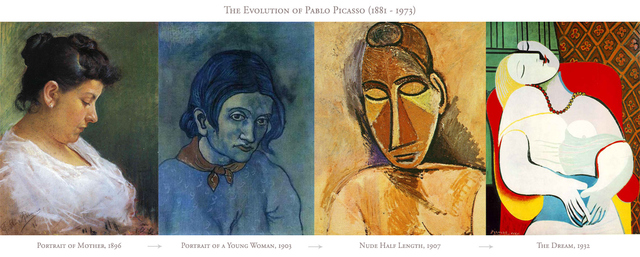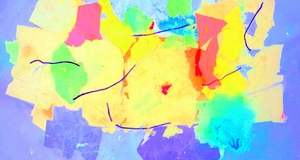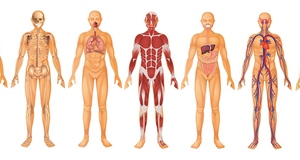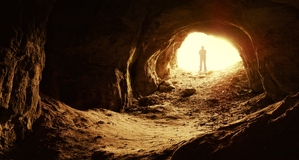Opinion:Describing the World or Transforming It? Considering the Roles of the Arts and the Natural Sciences
By
2014, Vol. 6 No. 08 | pg. 2/2 | « While superficial inspection suggests that both areas of knowledge are solely aligned with description, a deeper investigation reveals a more complex relationship. Without understanding the existing paradigm (a common pattern of thinking), it is difficult to transform it. This is especially relevant in the arts, as innovation in the realm of creativity is impossible without an understanding of the descriptive principles of tone, texture, form, and structure. Indeed, the most well recognized artists of the 20th century began their careers through assiduous imitation and description. Artists including Pablo Picasso and Henri Matisse learned classical techniques of painting, before their styles metamorphosed from conventionally descriptive to abstract. The continuum of Picasso’s work is evident in his portraits of women that begin in the style of Photorealism and conclude with highly symbolic Cubism. It is clear that Picasso was a master in his use of emotion and a visual language that he himself had pioneered—each of his stylistic periods evoke a particular mood in the viewer. Over the years, Picasso transformed the way the public viewed the function of art: rather than insisting on accurate representation he challenged viewers to rethink assumptions about the human form. Sometimes such art can be unsettling because it requires the viewer to delve deeper and read between the lines to make sense of it. Such an approach transforms our way of looking at ourselves and enhances our sense of the world.In a different manner, Erich Maria Remarque’s novel All Quiet on the Western Front serves as both a piece of descriptive and transformational literature. The novel realistically portrays the horrors of war, and depicts the psychological turmoil of German soldiers returning home after World War I (Clardy, 2010). Fundamentally, Remarque uses the ways of knowing of language and emotion to evoke strong feelings of loss that accompany wars. I consider Remarque’s novel to be transformative through its subversive nature and clear antiwar sentiment; it illustrated to the world the irrationality of pitting humans against one another other in the name of nationalism. All Quiet on the Western Front remains a seminal piece of literature with themes that still have lasting implications today. When considering modern day conflicts, the words of Remarque still ring loud and clear, heeding against the temptation of war. Thus it seems that the arts can also fall under the category of transformation, either through stylistic evolution or subversion of beliefs. In the natural sciences, a similar relationship between description and transformation is also evident, as transformation cannot exist without a strong link to the known body of knowledge that came before. Transformation occurs when scientists create new theories to explain observations that don’t fit the existing paradigm. For example, scientists in the 17th century were faced with the task of explaining why open containers of meat produced maggots, while tightly sealed containers didn’t. Francesco Redi conducted a series of experiments and subsequently developed a theory of germs that transformed the prevalent Aristotelian belief of spontaneous generation ('Francesco Redi', 2014). In this case, the transformation could not be put practically into use in an accessible and understandable way without further description. It was only in the 19th century that Robert Koch expanded on Redi’s work and derived four descriptive criteria illustrating how diseases are caused by microorganisms (Life.umd.edu, 2014). Koch’s criteria illustrate how the early innovations by Redi were later put into practical use through careful description. Certain areas of knowledge place an emphasis chiefly on description or explanation of the world, while others seek to transform it. I believe that the relationship between description and transformation is connected, as one cannot occur exclusively without the other. Description helps transform the future, and transformation helps describe the present. I believe the functions of description and transformation are like two heads of the same coin, like day and night, symbiotically related. ReferencesBird, A. (2004). Thomas Kuhn. Stanford Encyclopedia of Philosophy. Retrieved 10 June 2014, from http://plato.stanford.edu/entries/thomas-kuhn/ Clardy, P. (2010). All Quiet on the Western Front - Modernism Lab Essays. Modernism.research.yale.edu. Retrieved 8 June 2014, from http://modernism.research.yale.edu/wiki/index.php/All_Quiet_on_the_Western_Front Escher, M. C. (1941). Retrieved from http://www.mcescher.com/gallery/back-in-holland/no-45-angel-devil/ Escher, M. C. (1953). Retrieved from http://www.mcescher.com/gallery/back-in-holland/relativity/ Filo, J.P. (1970). Retrieved from http://en.wikipedia.org/wiki/File:Kent_State_massacre.jpg Fisher, R. A. (1936). Has Mendel’s work been rediscovered?. Annals Of Science, 1(2), 115-137. Retrieved from http://datacolada.org/wp-content/uploads/2014/04/3343-Fisher-1936-Has-mendels-findings-been-rediscored.pdf Francesco Redi.(2014). In Encyclopædia Britannica. Retrieved from http://www.britannica.com/EBchecked/topic/494690/Francesco-Redi Gass, R. (2012).What is Transformation? 1st ed. [ebook] Retrieved from http://scalingwhatworks.org/storage/documents/what_is_transformation.pdf Genetics Home Reference,. (2014). Beta thalassemia. Retrieved 9 June 2014, from http://ghr.nlm.nih.gov/condition/beta-thalassemia Kolata, G. (2013). Human Genome, Then and Now. Nytimes.com. Retrieved 9 June 2014, from http://www.nytimes.com/2013/04/16/science/the-human-genome-project-then-and-now.html Life.umd.edu,. (2014). Koch's Postulates. Retrieved 15 June 2014, from http://www.life.umd.edu/classroom/bsci424/BSCI223WebSiteFiles/KochsPostulates.htm McClean, P. (2000). Mendelian Genetics. Ndsu.edu. Retrieved 7 June 2014, from http://www.ndsu.edu/pubweb/~mcclean/plsc431/mendel/mendel1.htm National Gallery of Art,. (2007). M.C. Escher — Life and Work. Retrieved 9 June 2014, from http://www.nga.gov/content/ngaweb/features/slideshows/mc-escher-life-and-work.html Sarudy, B. (2012). The Evolution of Pablo Picasso's Portraits of Women. It's About Time. Retrieved from Available at: http://bjws.blogspot.com.au/2011/06/evolution-of-womens-portraits-by.html Suggested Reading from Inquiries Journal
Inquiries Journal provides undergraduate and graduate students around the world a platform for the wide dissemination of academic work over a range of core disciplines. Representing the work of students from hundreds of institutions around the globe, Inquiries Journal's large database of academic articles is completely free. Learn more | Blog | Submit Latest in Philosophy |



















